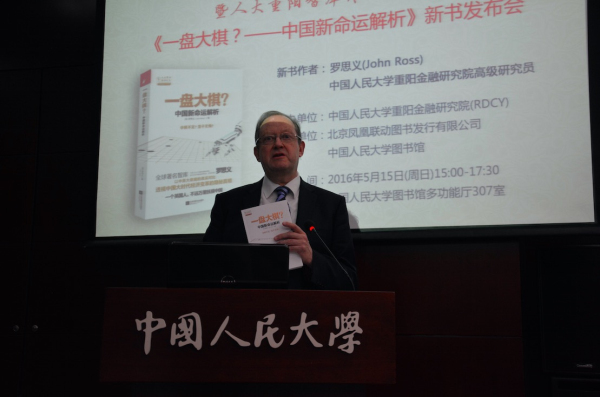 |
|
John Ross at the book launch ceremony.[Photo provided to chinadaily.com.cn] |
The launch of Big Chess, by John Ross, the former Policy Director of Economic and Business Policy of London, and currently full-time foreign senior researcher of the Chongyang Institute for Financial Studies, Renmin University of China, was held on May 15.
Ross has studied international economies, including China’s, for over thirty years, giving him a deep and broad perspective.
In an inclusive interview with China Daily website, Ross explained that the book is in three parts: why the Chinese economy has grown so fast, why the US economy grew quickly in the past and why it’s failing now, and what the economic relationship is between China and the US. As the name of the book indicates, the book is mainly about the strategic game between these two major players.
Ross described some of his experiences over so many years. For example, in 1992 he traveled to Russia and wrote an article called “Why economic reform will succeed in China but fail in Russia”. At that time, Ross had had almost no contact with China; the article was theoretical analysis. But it created a great sensation in Russia. The public responded?deeply to his opinion,even Vice President?expressed his response?to?Ross personally. Actually, Ross’ predictions for the Russian economy were amazingly accurate. He has brought the same insight and analytic skill to China’s on-going economic reform in Big Chess.
He explained that his analysis looks closely at four economic factors. The first and most powerful force of economic development is direct division of labor expressed in the growth of products used up in a single production cycle – ‘intermediate products’. This factor is strongly developed in the most advanced economies. The second most powerful force of production is fixed investment – that is, products of labor used up over more than one production cycle. Thirdly, as an economy develops, the role played by improvements in labor quality (through training and skill development) rises relative to increases in labor quantity (total hours worked by the labor force). Lastly, total factor productivity (TFP) accounts for about 10% of growth due to ‘Solow factors’ of production – individual entrepreneurship is included in this 10%.
When asked whether China’s economy would grow in an “L shape”, he said it depends on the numbers at the bottom of the L. As the goal set for the 13th Five Year Plan indicates, if GDP growth rate stays within 6.5%-7%, there’s no big problem. If the international economic situation improves, China’s economy will definitely grow faster. But he is not optimistic about international economic development within the next five to seven years.
Various economists and scholars have expressed their admiration for Ross’ new book in exclusive comments to the China Daily website. Wei Benhua, former deputy director of the Administration of Foreign Exchange, highly recommends Ross’ book for its neutral and objective view from an international economist with a great passion for studies in the Chinese economy.
Liu Zhiqin, former chief representative of Zurich Cantonal Bank, feels that we should especially value the two main points of this book: firstly, part of the US economy’s slowdown can be contributed to the US’s attempt to create a policy based on ‘individual entrepreneurship’, while, by contrast, China, because it has based its economic development on socialization or division of labor, has been able to gather the most powerful forces of production and has therefore experienced the most rapid economic growth in world history. This difference has extremely practical significance when our authority is implementing policies that encourage people to do business creatively and drive innovation. Secondly, Ross thinks that consumption can hardly contribute to GDP growth; what really matters is to increase investment share. So when it comes to policy making, he suggests giving priority to investment and letting consumption play a subsidiary role. This point?is similar?with Justin Yifu Lin, the former vice president of the World Bank.
Liu also said he was impressed by Ross’ calm and accurate analysis of the current situation: he is neither too optimistic nor negative; he confronts the problems rather than avoiding them.
All in all, Ross’ confidence and analysis are based on both his fruitful experiences and solid theoretical work: he firmly believes that China stands on the economic foundation of Adam Smith as continued by Karl Marx. This demonstrates that “division of labor” to use Adam Smith’s term, or “socialization of labor” to use Karl Marx’s, is the most powerful productive force. This analysis is fully confirmed by modern econometrics, and has been developed in its modern form in China. Up to now, findings not only of Marxism but also of modern Western economic research entirely confirm Xi Jinping’s conclusions regarding the correctness of Marxist economics and an emphasis on the supply side. It is “socialized labor”, the working class, that is overwhelmingly the most powerful force in increasing production.
John Ross, Wei Benhua and Liu Zhiqin are researchers at the Chongyang Institute for Financial Studies, Renmin University of China ( RDCY).

I’ve lived in China for quite a considerable time including my graduate school years, travelled and worked in a few cities and still choose my destination taking into consideration the density of smog or PM2.5 particulate matter in the region.